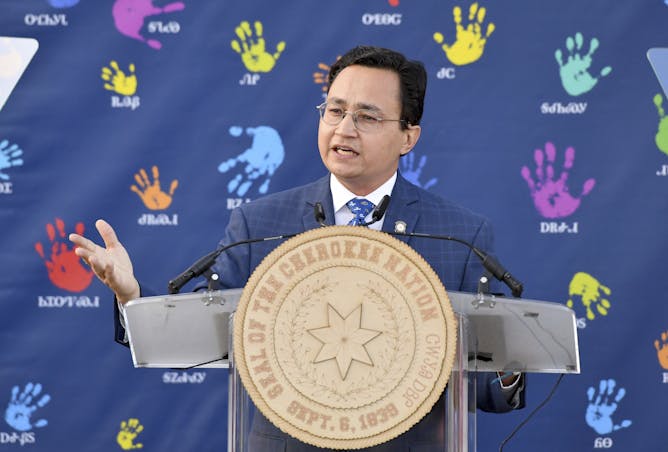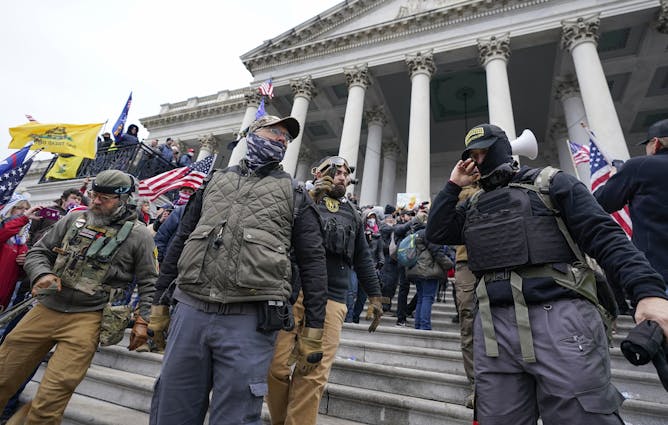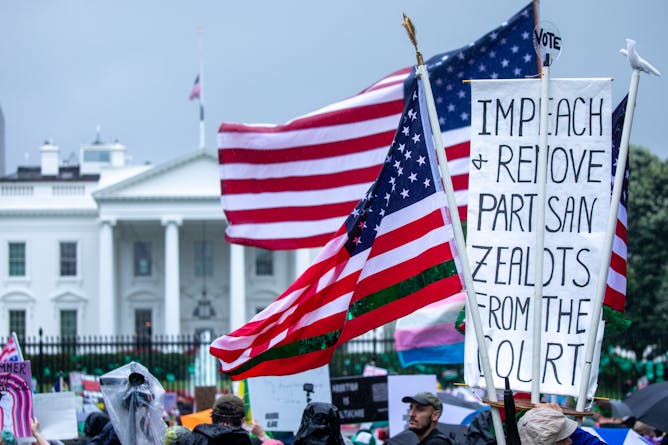|
|
|
|
There were many headline-grabbing rulings from the Supreme Court this year, from abortion to guns to school prayer. One important ruling that received somewhat less attention concerned Native American sovereignty – the right of tribes to govern themselves.
Legal scholar Kirsten Matoy Carlson, a specialist in Native American law at Wayne State University, wrote this week about the Supreme Court ruling in the case of Oklahoma v. Castro-Huerta, which addressed how much power states should have in Indian Country. That ruling, which experts say rolled back almost 200 years of legal precedent, was one more example, Carlson writes, of how the court over the past 50 years “has ignored and reversed long-standing principles
of federal Indian law that protected tribal sovereignty.”
Meanwhile, Carlson says, Congress has taken the opposite tack and expanded Native rights over the same period.
One of the four justices who dissented from the decision is usually found signing on to more conservative rulings: Neil Gorsuch, a Westerner with much experience in Indian law when he came to the court. Gorsuch wrote the scathing dissent – which was joined by his three liberal colleagues – calling the decision “an embarrassing new entry into the anti-canon of Indian law. … Truly, a more ahistorical and mistaken statement of Indian law would be hard to fathom.”
This week we also explored what the Bible actually says about abortion, the political and economic crisis in Sri Lanka and former President Trump’s connection to the Capitol rioters.
|

|
Naomi Schalit
Senior Editor, Politics + Society
|
|

Principal Chief of the Cherokee Nation Chuck Hoskin Jr. speaks in Tahlequah, Okla. A U.S. Supreme Court ruling is upending decades of law in support of tribes.
AP Photo/Michael Woods
Kirsten Matoy Carlson, Wayne State University
For the past 50 years, the Supreme Court has issued rulings that narrow tribal rights while Congress has worked to expand them. A recent ruling struck yet another blow against Native sovereignty.
|

Members of the Oath Keepers stand outside the U.S. Capitol on Jan. 6, 2021.
Manuel Balce Ceneta/Associated Press
Amy Cooter, Vanderbilt University
Nationalist militia groups like the Oath Keepers have changed over the last several years – especially since the Capitol attack – in a few important ways, generally becoming more extreme.
|

“Impeach and remove partisan zealots from the court,” reads one protester’s sign in front of the U.S. Supreme Court on July 9, 2022.
Yasin Ozturk/Anadolu Agency via Getty Images
Calvin Schermerhorn, Arizona State University
History shows that political contests over the ideological slant of the court are nothing new.
|
|
|
-
Alexander Hinton, Rutgers University - Newark
Russia and other countries and political regimes have a long history of forcing people to move, mostly for security and economic gains.
-
Kaitlyn Ugoretz, University of California Santa Barbara
A scholar of Japanese religion explains the connections that Japan’s political parties have with several religious groups and how religion is tied in with the legacy of Shinzo Abe.
-
Melanie A. Howard, Fresno Pacific University
Faith can inform opinions about abortion on both sides of the political debate, but the Bible itself says nothing directly about the topic, a biblical scholar explains.
-
Abby Kiesa, Tufts University
As many as 80% of young people want abortion to be legal, and most disagree with the Supreme Court’s recent Dobbs v. Jackson ruling. This could lead to high youth voting rates in the 2022 midterms.
-
Georges Naufal, Texas A&M University
Political and economic forces across the Middle East and North Africa combine to mean well-educated young people spend years looking for work, which delays their independence and adulthood.
-
Gretchen E. Ely, University of Tennessee
Abortion funds, which help people who cannot afford the procedure, are facing new kinds of pressures, including potential legal risks and a rising client demand that exceeds their capabilities.
-
Neil DeVotta, Wake Forest University
Protests over shortages forced the ouster of Sri Lanka’s president, but the crisis has deep-set roots in ethnonationalism, which has encouraged corruption, argues an expert on the country’s politics.
|
|
|
Like this newsletter? You might be interested in our other weekly emails:
|
| |
| |
| |
| |
|
|
|
|
|
|
|